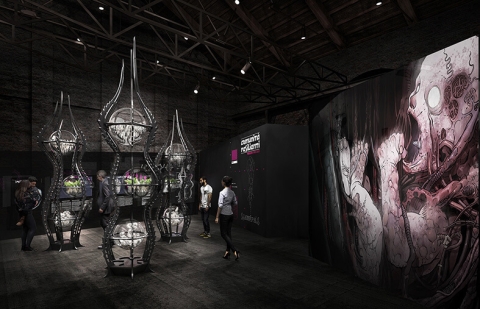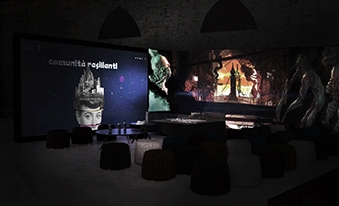

Professor Melis has one of the most prestigious roles in the architectural world as the curator of the Italian National Pavilion at the 17th Venice Architecture Biennale.
30 April 2021
4 min read
Professor Alessandro Melis has one of the most prestigious roles in the architectural world as the curator of the Italian National Pavilion at the 17th Venice Architecture Biennale, which opens to the public next month.
The architecture exhibition is part of the world-famous Venice Biennale, which, for over 120 years, has been one of the most prestigious cultural events in the world (the first international Architecture Exhibition took place in 1980).
Professor Melis, an Italian architect and Professor of Architecture Innovation in the School of Architecture, was appointed by the Italian Minister of Cultural Heritage as the curator of the Italian Pavilion - individual nations produce their own shows, known as pavilions, as their national representation. He said: “It is a great honour being made the curator for your country’s pavilion. The Venice Biennale is universally recognised as the most important global event in the world of architecture. Being there is like receiving an Oscar for an actor or a film director.
“It is a recognition that is worth a whole career. Probably, in the case of the Italian Pavilion, this is even more true, since Italy is the host country and its pavilion is by far the largest one.”

Artists' impression of the Italian Pavilion
For his pavilion, entitled ‘Resilient Communities’, Professor Melis has brought together geneticists, philosophers and environmental scientists to address the issue of climate change and the demanding challenges for architecture in Italian towns and cities. It is based on the principle that architecture must make a tangible contribution towards improving quality of life by providing meaningful responses to current environmental and social pressures.
Professor Melis added: “The Italian Pavilion will itself be a resilient community, consisting of 14 “sub-communities” operating as workshops, research centres or case studies with two essential themes: showcasing state of the art urban resilience in Italy and the world through the works by eminent Italian architects; and interdisciplinary methodologies, innovation, and research between architecture, botany, biology, art, and medicine.”

It is a great honour being made the curator for your country’s pavilion. The Venice Biennale is universally recognised as the most important global event in the world of architecture. Being there is like receiving an Oscar for an actor or a film director. It is a recognition that is worth a whole career.
Professor Alessandro Melis, Curator of the Italian National Pavilion
The Pavilion will be virtually carbon neutral as it will reuse materials from the Italian Pavilion at the 2019 Venice Biennale and all the exhibits will be relocated to permanent settings. Professor Melis said: “This will present a unique opportunity not only to exhibit works consistent with the proposal’s objectives, but also an occasion to study the life cycle of a development in a setting of resilience.”
The 17th Venice Architecture Biennale, which was originally scheduled for 2020 but postponed because of the global COVID-19 pandemic, will run from 22 May to 21 November 2021. Titled ‘How will we live together?’, the exhibition includes 112 participants from 46 countries, with a growing delegation from Africa, Latin America and Asia.
A wide range of in-person and online events has been planned for the entire duration of the exhibition, which can be found on the Italian Pavilion’s website.
In 2020, Professor Melis was chosen by the Italian Minister of Foreign Affairs to be an ambassador of Italian Design. He said: “I am very proud to represent Italy, a country where product design and industrial design are major areas in which we are world-leading. I feel honoured to be able to share and highlight our expertise in open planning, product design and architecture.”

Artists' impression of the Italian Pavilion
Director of the Cluster for Sustainable Cities at the University of Portsmouth, his research topics concern innovation in the field of environmental sustainability, resilience and regeneration. He has been the curator and keynote speaker at numerous conferences, such as the MoMA in New York and the China Academy of Art. He currently coordinates international research projects on resilience in architecture.
In 1996, Professor Melis founded Heliopolis 21, an architecture and urban design company based in Italy and Germany. Heliopolis 21 has recently designed building SR1938 at the University of Pisa, which is considered a model for sustainable architecture.
